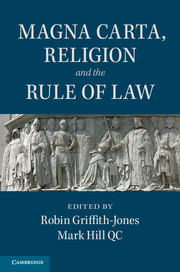Book contents
- Frontmatter
- Contents
- List of contributors
- Preface and acknowledgments
- I Introduction
- II The birth of Magna Carta and the spread of its principles
- III Comparative religious approaches to Magna Carta's rule of law
- 9 Quranic Magna Carta: on the origins of the rule of law in Islam
- 10 Justice in Islamic legislation
- 11 Shariʿa and the rule of law: preserving the realm
- 12 Democracy and the power of religion: some lessons from India
- 13 The still small voice of Magna Carta in Christian law today
- 14 Magna Carta, rule of law and religious diversity
- IV The contemporary inheritance of Magna Carta
- Appendix The Charters in translation
- Bibliography
- Index
14 - Magna Carta, rule of law and religious diversity
from III - Comparative religious approaches to Magna Carta's rule of law
Published online by Cambridge University Press: 05 May 2015
- Frontmatter
- Contents
- List of contributors
- Preface and acknowledgments
- I Introduction
- II The birth of Magna Carta and the spread of its principles
- III Comparative religious approaches to Magna Carta's rule of law
- 9 Quranic Magna Carta: on the origins of the rule of law in Islam
- 10 Justice in Islamic legislation
- 11 Shariʿa and the rule of law: preserving the realm
- 12 Democracy and the power of religion: some lessons from India
- 13 The still small voice of Magna Carta in Christian law today
- 14 Magna Carta, rule of law and religious diversity
- IV The contemporary inheritance of Magna Carta
- Appendix The Charters in translation
- Bibliography
- Index
Summary
Magna Carta has been venerated for eight centuries. It has been a symbol for the rule of law as well as English and Western exceptionalism. Magna Carta has, in this sense, functioned as a myth and an icon. It is true, as Sir John Baker's chapter in this volume discusses, that the actual influence of Magna Carta between 1215 and the late sixteenth century was minimal. Yet stories and myths about Magna Carta are significant. The term ‘story’ or ‘myth’ implies that an account is false or misleading. At the same time, a ‘myth’ also has a positive meaning because it can have symbolic value, as a story that can use the past to teach us a valuable lesson about the present and suggest alternative choices for the future.
I want to suggest that one such lesson relates to contemporary religious diversity. Magna Carta may, I argue, provide a foundation to build a cohesive liberal legal and political order in the face of increasing religious diversity. However, this optimism needs to be balanced against a realistic recognition that Magna Carta can also be misused as an ‘ethno-nationalist’ myth to attack religious minorities. In any discussion of the use of Magna Carta to secure religious freedom or integration, therefore, it is important to distinguish the positive uses of Magna Carta as a ‘shield’ from its misuse as a ‘sword’ or ‘stick’ with which to beat vulnerable religious minorities.
Magna Carta as a shield for religious minorities
Religious diversity is a social fact in most European liberal democracies. Whilst there has always been such diversity, the present context is different in significant respects. Although the experience of immigration is not new, the scale and intensity of the global movement of people in large numbers from one nation to another has become more intense. Moreover, the fact that this movement is now from non-Western into Western nations means that it has become important also to tackle the diversity that emerges because of the presence of non-Western religious and cultural traditions. Although developing a sharp binary between Western and non-Western contexts can be problematic, it is relevant to an analysis because it increases the complexity of understanding and accommodating cultural and religious practices.
- Type
- Chapter
- Information
- Magna Carta, Religion and the Rule of Law , pp. 248 - 264Publisher: Cambridge University PressPrint publication year: 2015



